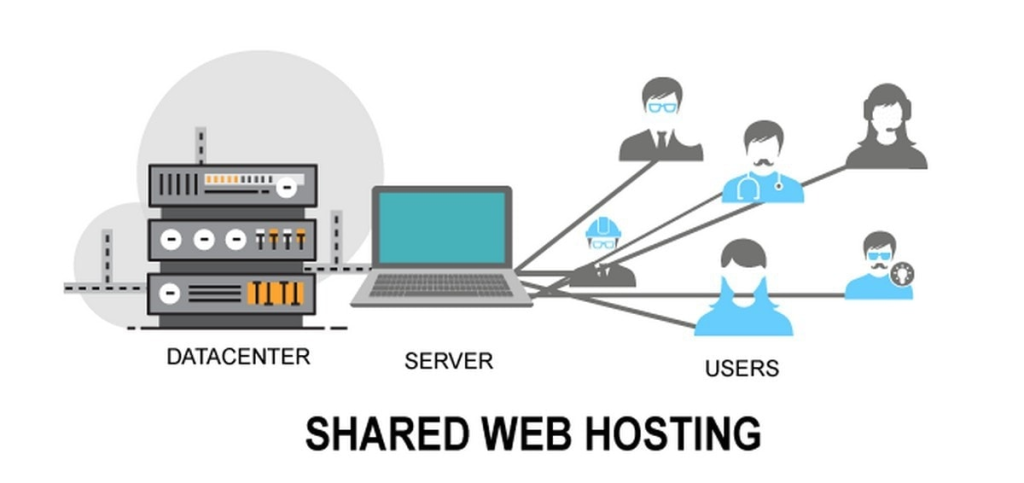
What is Shared hosting?

Shared hosting is a type of web hosting service where multiple websites are hosted on a single server and share its resources, such as disk space, bandwidth, and processing power. In this hosting environment, each website has its own partition or directory on the server, but they all use the same server resources.
Here are some key features of shared hosting:
- Cost-Effective: Shared hosting is generally more affordable compared to other types of hosting, such as dedicated hosting or VPS (Virtual Private Server) hosting, because the server resources are shared among multiple users.
- Ease of Use: Shared hosting is often recommended for beginners or small businesses due to its simplicity. The hosting provider takes care of server maintenance, updates, and technical issues, allowing users to focus on managing their websites.
- Resource Limitations: Since resources are shared among multiple websites on the same server, there are limitations on the amount of server resources each website can use. If one website experiences a sudden surge in traffic, it may affect the performance of other websites on the same server.
- Limited Customization: Users on shared hosting have limited control over server settings and configurations. Advanced configurations and custom software installations are usually restricted for security and stability reasons.
- Suitable for Small to Medium-Sized Websites: Shared hosting is well-suited for small to medium-sized websites that don’t require extensive server resources. It may not be ideal for large-scale websites with high traffic and resource demands.

While shared hosting is a cost-effective and user-friendly option, it may not be suitable for all types of websites, especially those with high traffic or specific performance requirements. As a website grows, users might consider upgrading to a more robust hosting solution, such as VPS or dedicated hosting, to accommodate increased resource needs.
What is Reseller hosting?
Reseller hosting is a type of web hosting service where an individual or a company purchases hosting resources from a hosting provider in bulk and then sells or rents out these resources to their own clients. In other words, a reseller acts as an intermediary between the hosting provider and the end-users.
Here are the key features of reseller hosting:
- Purchase and Resell: A reseller buys a hosting package or server resources from a hosting company in bulk and then divides and sells or rents out these resources to individual clients or businesses.
- Branding and Customization: Resellers often have the ability to brand the hosting services with their own company name and logo. They may also have the option to customize certain aspects of the hosting environment, such as setting their own pricing plans and features.
- Management Control: While resellers have control over the hosting packages they offer to their clients, they typically do not have control over the server itself. The hosting provider is responsible for server maintenance, hardware upgrades, and overall server management.
- Customer Support: Depending on the arrangement with the hosting provider, resellers may provide their own customer support or rely on the hosting company’s support services. Some reseller hosting plans come with white-label support, allowing the reseller to offer support under their own brand.
- Ideal for Entrepreneurs and Web Designers: Reseller hosting is often chosen by entrepreneurs, web designers, or individuals who want to start their own hosting business without the need to invest in and manage their own servers.
- Scalability: Reseller hosting allows individuals or small businesses to start with a small set of resources and scale up as their hosting business grows. This makes it a flexible option for those who want to gradually expand their hosting services.
It’s important for resellers to choose a reliable hosting provider with a good reputation and robust infrastructure to ensure the stability and performance of the services they offer to their clients. Additionally, resellers need to manage customer billing, support, and other aspects of their hosting business.
What is the difference between shared and Reseller hosting?

| Features | Shared Hosting | Reseller Hosting |
| Purpose and Target Audience | Designed for individual website owners, small businesses, or organizations with one or a few websites. Users share server resources, and it’s suitable for those who don’t need advanced customization or control over server settings. | Geared towards entrepreneurs, web designers, or individuals who want to start their own hosting business. Reseller hosting allows users to purchase server resources in bulk and resell them to their own clients. |
| Management and Control | Users have limited control over server settings and configurations. The hosting provider takes care of server maintenance and management tasks. | Resellers have more control over the hosting environment. While they can customize their hosting packages, they typically don’t have control over the server itself, as server management remains the responsibility of the hosting provider. |
| Branding and Customization | Users typically don’t have the option to brand the hosting services or customize server settings. They choose from the hosting provider’s predefined plans. | Resellers often have the ability to brand the hosting services with their own company name and logo. They can set their own pricing plans and features, providing a more customized experience for their clients. |
| Customer Support | Customer support is usually provided by the hosting company. Users contact the hosting provider’s support team for assistance. | Depending on the arrangement with the hosting provider, resellers may provide their own customer support or rely on the hosting company’s support services. Some reseller hosting plans come with white-label support. |
| Number of Accounts | Each account on a shared hosting server belongs to an individual or a business hosting a single website or a few websites. | Resellers can host multiple individual clients, each with their own separate hosting accounts. This makes reseller hosting suitable for those looking to manage multiple websites for different clients. |
| Scalability | Limited scalability, as users are constrained by the resources allocated in their shared hosting plan. | More scalable, as resellers can purchase additional resources as their hosting business grows. This flexibility allows for gradual expansion. |
Both shared hosting and reseller hosting have their advantages, and the choice between them depends on the specific needs and goals of the user or business. Shared hosting is more suitable for individual website owners, while reseller hosting is ideal for those looking to start their own hosting business and manage multiple clients.
